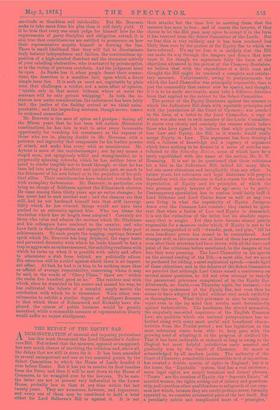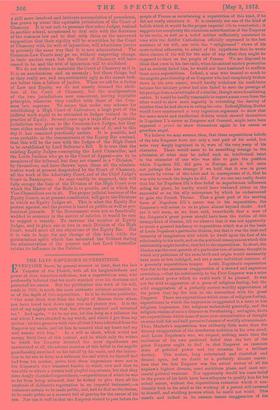THE REVOLT OF THE EQUITY BAR.
ADEMONSTRATION of unusual and imposing pretensions has this week threatened the Lord Chancellor's Judica- ture Bill. Not indeed that the measure, opposed or unopposed, has now much chance of surviving the criticism and, above all, the delays that are still in store for it. It has been amended in several unimportant and one or two material points by the Select Committee, to which the House of Lords handed it over before Easter. But it has yet to receive its final touches from the Peers, and then it will be sent down to the House of Commons, to be wrangled over by the lawyers. To be sure, the latter are not at present very influential in the Lower House, probably less so than at any time within the last twenty years. They are numerous, however, and loquacious, and every one of them may be considered to hold a brief either for Lord Selborne's Bill or against it. It is not their attacks, but the time lost in meeting them, that the measure has most to fear ; and of course the lawyers, if they choose to let the Bill pass, may agree to accept it in the form it has received from the Select Committee of the Lords. But we fear this is very unlikely, and it has been rendered less likely than ever by the protest of the Equity Bar to which we have referred. We say we fear it is unlikely that the Bill can make its way through the dangers and delays that now beset it, for though we appreciate fully the force of the objections advanced in the protest of the Chancery Barristers, we believe that with the expenditure of a little time and thought the Bill might be rendered a complete and satisfac- tory measure. Unfortunately, owing to postponements for which the Lord Chancellor was principally responsible, time is just the commodity that cannot now be spared, and thought, if it is to be made serviceable, must take a different direction from that applied to the subject by the Select Committee.
The protest of the Equity Barristers against the manner in which the Judicature Bill deals with equitable principles and with the jurisdiction of the Court of Chancery, was couched in the form of a letter to the Lord Chancellor, a copy of which was also sent to each member of the Lords' Committee. It states very clearly and concisely the reasons which induce those who have signed it to believe that while professing to fuse Law and Equity, the Bill, as it stands, would really merge Equity in Law. This argument has been developed with a fullness of knowledge and a cogency of argument which leave nothing to be desired in a series of articles con- tributed to the Saturday Review, some of which have been lately republished with the name of the author, Mr. G. W. Hemming. It is not to be questioned that these criticisms hit a blot in the Judicature Bill, indeed hit many blots, but one more obnoxious and inexplicable than any other. In future years, law reformers and legal historians will perplex themselves with the endeavour to find a reason for the curious depreciation of Equity and its principles of which the two greatest equity lawyers of the age seem to be guilty. Contemporary speculation has to confess itself fairly baftl-d. Lord Selborne and Lord Cairns know as well as any two men living in what the superiority of Equity Jurispru- dence over the Common Law consists ; they cannot be igno- rant that when a fusion of Law and Equity is demanded, it is not the extinction of the latter, but its absolute supre- macy that is sought. Yet they have become almost jointly responsible for a measure under which, if Equity is not to be at once extinguished it will "dwindle, peak, and pine," till its once beneficent power has ceased to be remembered. And stranger still, in this course one at least of them has persevered even after their attention had been drawn, with all the force and point of the criticisms before mentioned, to the dangers of the line they were pursuing. The Lord Chancellor in his speech on the second reading of the Bill,—a most able, but we must be pardoned for adding, a most sophistical speech,—made light of these objections, and in the debates of the Select Committee we perceive that although Lord Cairns raised a controversy on several minor questions, he did not even attempt to remedy the paramount grievance complained of by the Equity Bar. Afterwards, no doubt,—on Thursday night, for instance,—be became the spokesman of the Equity Bar, but even then he seems to have adopted his brief without very much cordiality or thoroughness. What this grievance is may be easily con- veyed even to the lay mind that revolts most determinedly against technicalities. The harshness, the absurd anomalies, the singularly one-sided impotence of the English Common Law, are qualities which our national jurisprudence has in- herited along with many most useful and beneficent charac- teristics from the Feudal period ; nor has legislation in the most reforming times been able to keep pace with the growing need of adapting it to the progress of civilised life. That it has been endurable or endured so long is owing to the illogical but most helpful jurisdiction early asserted and gradually won by the Court of Chancery. So much is acknowledged by all modern jurists. The authority of the Court of Chancery, armed with the irresistible writ of injunction, has created a double system of rights in England ; but it is the inner, the "Equitable " system, that has a real existence ; mere legal rights are simply technical and formal phrases. " Trusts " are the creation of Equity, the" Separate Estate "of married women, the rights arising out of infancy and guardian- ship, and countless other qualifications or safeguards of our com- mon law which, because they are rarely; perhaps never, formally appealed to, we consider substantial parts of the law itself. But a peculiarly subtle and complicated mass of "principles," a still more involved and intricate accumulation of precedents, has grown up about this equitable jurisdiction of the Court of Chancery. It is not safe to presume that other Judges, trained in another school, accustomed to deal only with the doctrines of the common law and to deal with them on the unavowed supposition that their rigidity will be overridden by the Court of Chancery with its writ of injunction, will administer justice in precisely the same way that it is now administered. The Common-Law Courts may go on, without suspecting change, in their ancient ways, but the Court of Chancery will have ceased to be, and the writ of injunction will be abolished.
We do not desire to maintain the Court of Chancery as it is. It is an anachronism and an anomaly ; but these things, bad as they really are, and unquestionably ugly as the names look, are better than a failure of justice. When we ask for a fusion of Law and 'Equity, we do not merely demand the aboli- tion of the Court of Chancery, but the amalgamation of the two jurisdictions now concurrent, leaving equitable principles, wherever they conflict with those of the Com- mon law, supreme. To secure this under any scheme for establishing a High Court of Judicature, a large part of the judicial work ought to be entrusted to Judges trained in the practice of Equity. Several years ago a large slice of equitable jurisdiction was given to the Common-Law Judges, but they were either unable or unwilling to make use of it, and to this day it has remained practically useless. It is possible, and even probable, as the remonstrants of the Equity Bar contend, that this will be the case with the Judges of the High Court to he established by Lord Selborne's Bill. It is true that the existing Equity Judges—excepting the Lord Chancellor, and the Lords Justices who go to the Court of Appeal—are to be members of the tribunal, but they are classed in a " Division " by themselves, and have thrown upon them all the adminis- trative work at present despatched by the Court of Chancery, all the work of the Admiralty Court, and of the Chief Judge's Court in Bankruptcy. As may readily be supposed, this will fully occupy the time of the Division of the High Court over which the Master of the Rolls is to preside, and in which the Vice-Chancellors are to sit. The proper judicial business of the Equity Courts, as at present constituted, will go to the Divisions in which no Equity Judges sit. This is what the Equity Bar protest against, and the protest is based on public as well as pro- fessional grounds. If the Government were not so fanatically wedded to economy in the matter of salaries, it would be easy to suggest a remedy. To increase the number of Equity Judges, and to place one or two in each Division of the High Court, would meet all the objections of the Equity Bar. But it is vain to hope for any change of this kind, while the parsimonious spirit which has animated the Cabinet during the adminstration of the present and last Lord Chancellor retains its influence in the Cabinet.



































 Previous page
Previous page